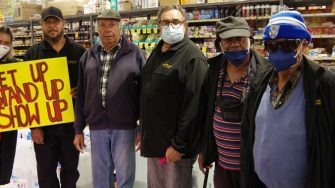
In Walgett, NSW, Aboriginal Community-Controlled Organisations (ACCOs) are calling on the NSW Government to establish an independent, multi-agency taskforce to address the intolerable situation where drinking water is so high in sodium that it poses a threat to community members with existing health conditions.
UNSW experts and medical researchers from The George Institute for Global Health (TGI) have warned that the content of Walgett’s water supply is 15 times higher in sodium than medical practitioners recommend for long-term consumption by people with severe hypertension or renal and heart issues.
Professor Greg Leslie, director of the UNSW Global Water Institute, said the sodium level of the bore water was up to 300 mg/litre which was 15 times higher than the 20 mg/litre level recommended by the National Health and Medical Research Council for people with chronic health conditions such as hypertension, heart disease or kidney problems.
“The sodium levels in the groundwater are typically 290 to 300 mg/litre. The council needs help from the state government to lower the sodium levels when the town operates on groundwater,” he said.
“It’s not an acceptable situation."
A survey of Walgett Aboriginal community members, undertaken by UNSW and TGI in partnership with the Dharriwaa Elders Group and Walgett Aboriginal Medical Service, also found that the poor drinking water is having severe negative effects on household expenses and food security. Some people are paying up to $50 a week on bottled water to avoid using tap water, which in turn impacts their ability to afford other basic necessities. The survey used internationally validated tools which showed the levels of water insecurity in Walgett and the nearby villages of Namoi and Gingie are worse than those recorded in the Bangladesh capital city of Dhaka, Guatemala and Beirut in Lebanon.
UNSW-GWI has been working with the Walgett community since 2018 to help develop community-led solutions to its concerns about water and other pressing social, economic and environmental issues in Walgett. To solve the issues with drinking water, state government funding and support will be essential.
“We need a multi-agency taskforce to improve Walgett’s water quality and security comprising local, state and national agencies, drinking water expert and experts from local Aboriginal community-controlled organisations,” said Virginia Robinson, secretary of the Dharriwaa Elders Group.
“We are calling for a taskforce led by an independent expert endorsed by Walgett Aboriginal Community Controlled Organisations.“
